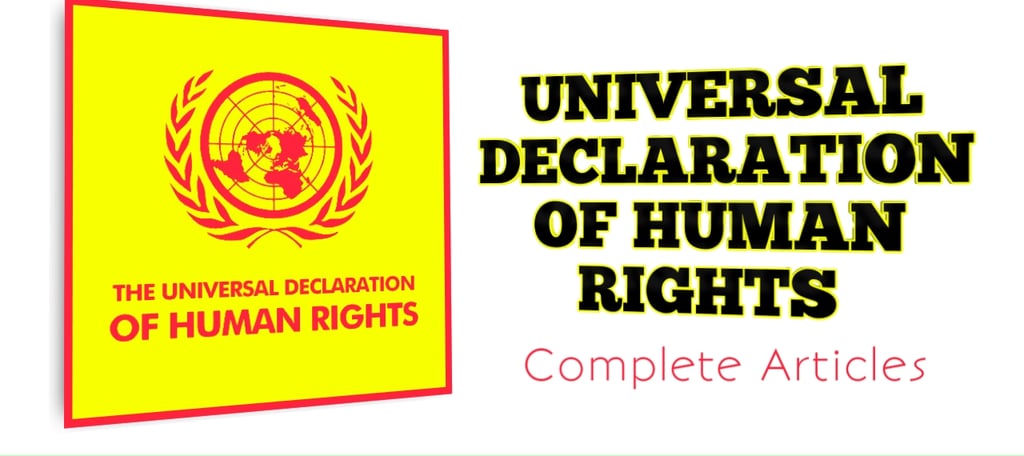UDHR - Universal Declaration of Human Rights
The Universal Declaration of Human Rights is a comprehensive document that sets forth the fundamental rights and freedoms to which all human beings are entitled
HOT TOPICS
12/8/20246 min read
The Universal Declaration of Human Rights: A Cornerstone of Human Dignity


The Universal Declaration of Human Rights (UDHR), adopted by the United Nations General Assembly on December 10, 1948, is a landmark document that enshrines the fundamental rights and freedoms to which all human beings are entitled, regardless of their race, color, sex, language, religion, political or other opinion, national or social origin, property, birth or other status. It is a beacon of hope, a testament to the enduring human spirit, and a blueprint for a world built on justice, equality, and dignity.
Preamble
The Preamble to the UDHR sets the stage for the declaration, emphasizing the need to reaffirm the inherent dignity and worth of all members of the human family and to promote universal respect for human rights and fundamental freedoms. It recognizes that these rights and freedoms are derived from the inherent dignity and worth of the human person and are essential for the full development and well-being of all individuals.
Article 1
Article 1 proclaims that all human beings are born free and equal in dignity and rights. This fundamental principle is the cornerstone of the UDHR, affirming that all individuals, irrespective of their circumstances, are entitled to the same basic rights and freedoms.
Article 2
Article 2 prohibits discrimination of any kind, whether based on race, color, sex, language, religion, political or other opinion, national or social origin, property, birth, or other status. It mandates that everyone is entitled to equal protection against any discrimination or incitement to discrimination.
Article 3
Article 3 affirms the right of everyone to life, liberty, and security of person. It recognizes that these rights are fundamental to human existence and well-being and are essential for the enjoyment of all other rights and freedoms.
Article 4
Article 4 prohibits slavery and servitude in all their forms. It recognizes that slavery is a fundamental violation of human dignity and that it is essential to eradicate this practice.
Article 5
Article 5 prohibits torture and other cruel, inhuman, or degrading treatment or punishment. It underscores the importance of protecting individuals from physical and psychological suffering and of ensuring that all forms of torture are absolutely prohibited.
Article 6
Article 6 affirms the right of everyone to recognition everywhere as a person before the law. It recognizes that this right is essential for the enjoyment of all other rights and freedoms and that it is essential to prevent discrimination and ensure that everyone is treated equally under the law.
Article 7
Article 7 affirms the principle that all are equal before the law and are entitled to equal protection of the law. It prohibits any discrimination in the enjoyment of rights and freedoms.
Article 8
Article 8 affirms the right to be granted effective remedy by competent national tribunals for acts violating the fundamental rights granted to him by law or constitution. It recognizes that this right is fundamental to human liberty and that it is essential to protect individuals from arbitrary deprivation of their freedom.
Article 9
Article 9 affirms the right of everyone to freedom from arbitrary arrest, detention, or exile. It recognizes that this right is fundamental to human liberty and that it is essential to protect individuals from arbitrary deprivation of their freedom.
Article 10
Article 10 affirms the right of everyone to a fair hearing by an independent and impartial tribunal in the determination of his rights and obligations and of any criminal charge against him. It recognizes that this right is essential for the protection of justice and the prevention of arbitrary deprivation of rights.
Article 11
Article 11 affirms the right of everyone charged with a penal offence to be presumed innocent until proved guilty according to law. It underscores the importance of the presumption of innocence and the need to ensure that everyone is treated fairly throughout the judicial process.
Article 12
Article 12 affirms the right of everyone to freedom from interference with his privacy, family, home, or correspondence and the right to the protection of his honor and reputation. It recognizes that these rights are fundamental to human dignity and that they are essential for the protection of individuals from arbitrary interference in their personal lives.
Article 13
Article 13 affirms the right of everyone to freedom of movement within a country and the right to leave any country, including his own. It recognizes that these rights are fundamental to human liberty and that they are essential for the prevention of arbitrary restrictions on movement.
Article 14
Article 14 affirms the right of everyone to seek asylum from persecution and to enjoy asylum in another country. It recognizes that this right is fundamental to human dignity and that it is essential for the protection of individuals from persecution.
Article 15
Article 15 affirms the right of everyone to a nationality. It recognizes that this right is fundamental to human identity and that it is essential for the prevention of statelessness.
Article 16
Article 16 affirms the right of men and women of marriageable age to enter into marriage and to found a family. It recognizes that this right is fundamental to human dignity and that it is essential for the well-being of individuals and families.
Article 17
Article 17 affirms the right of everyone to own property alone as well as in association with others. It recognizes that this right is fundamental to human dignity and that it is essential for the well-being of individuals and families.
Article 18
Article 18 affirms the right of everyone to freedom of thought, conscience, and religion. It recognizes that this right is fundamental to human dignity and that it is essential for the development of individuals and societies.
Article 19
Article 19 affirms the right of everyone to freedom of opinion and expression. It recognizes that this right is fundamental to human dignity and that it is essential for the development of individuals and societies.
Article 20
Article 20 affirms the right of everyone to freedom of peaceful assembly and association. It recognizes that this right is fundamental to human dignity and that it is essential for the development of individuals and societies.
Article 21
Article 21 affirms the right of everyone to participate in the government of his country, either directly or through freely chosen representatives. It recognizes that this right is fundamental to human dignity and that it is essential for the development of individuals and societies.
Article 22
Article 22 affirms the right of everyone to social security and the right to realization of the economic, social, and cultural rights indispensable for his dignity and the well-being of his family. It recognizes that these rights are fundamental to human dignity and that they are essential for the well-being of individuals and societies.
Article 23
Article 23 affirms the right of everyone to work, to free choice of employment, to just and favorable conditions of work, and to protection against unemployment. It recognizes that this right is fundamental to human dignity and that it is essential for the well-being of individuals and families.
Article 24
Article 24 affirms the right of everyone to rest and leisure. It recognizes that this right is fundamental to human dignity and that it is essential for the well-being of individuals and families.
Article 25
Article 25 affirms the right of everyone to a standard of living adequate for the health and well-being of himself and of his family, including food, clothing, housing, and medical care and necessary social services. It recognizes that this right is fundamental to human dignity and that it is essential for the well-being of individuals and families.
Article 26
Article 26 affirms the right of everyone to education. It recognizes that this right is fundamental to human dignity and that it is essential for the development of individuals and societies.
Article 27
Article 27 affirms the right of everyone to participate in the cultural life of the community, to enjoy the arts and sciences, and to benefit from the progress made. It recognizes that this right is fundamental to human dignity and that it is essential for the development of individuals and societies.
Article 28
Article 28 affirms the right of everyone to a social and international order in which the rights and freedoms set forth in the declaration can be fully realized. It recognizes that this right is fundamental to human dignity and that it is essential for the well-being of individuals and societies.
Article 29
Article 29 affirms that everyone has duties to other individuals and to the community in which he lives. It recognizes that these duties are necessary for the protection of the rights and freedoms of others and for the promotion of justice and the general welfare.
Article 30
Article 30 affirms that nothing in the declaration may be interpreted as implying for any State, group, or person a right to engage in any activity or to perform any act aimed at the destruction of any of the rights and freedoms set forth therein. It recognizes that these rights and freedoms are fundamental to human dignity and that they are essential for the well-being of individuals and societies.
The Universal Declaration of Human Rights is a comprehensive document that sets forth the fundamental rights and freedoms to which all human beings are entitled. It is a testament to the enduring human spirit and a blueprint for a world built on justice, equality, and dignity. The UDHR has inspired countless people worldwide to stand up for their rights and work for a more just and equitable world. It is a document that continues to be relevant today and that will continue to guide the struggle for human rights in the years to come.
